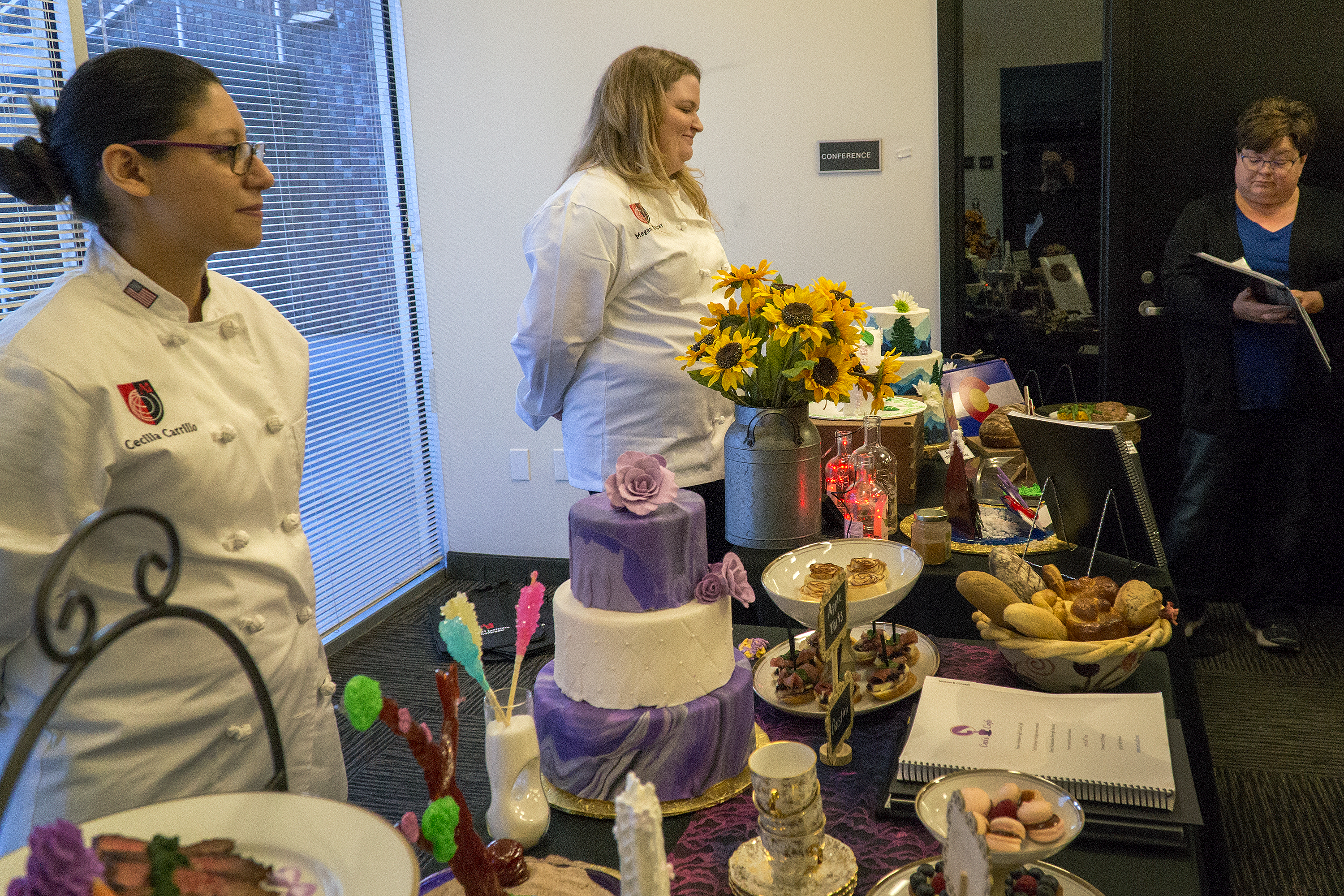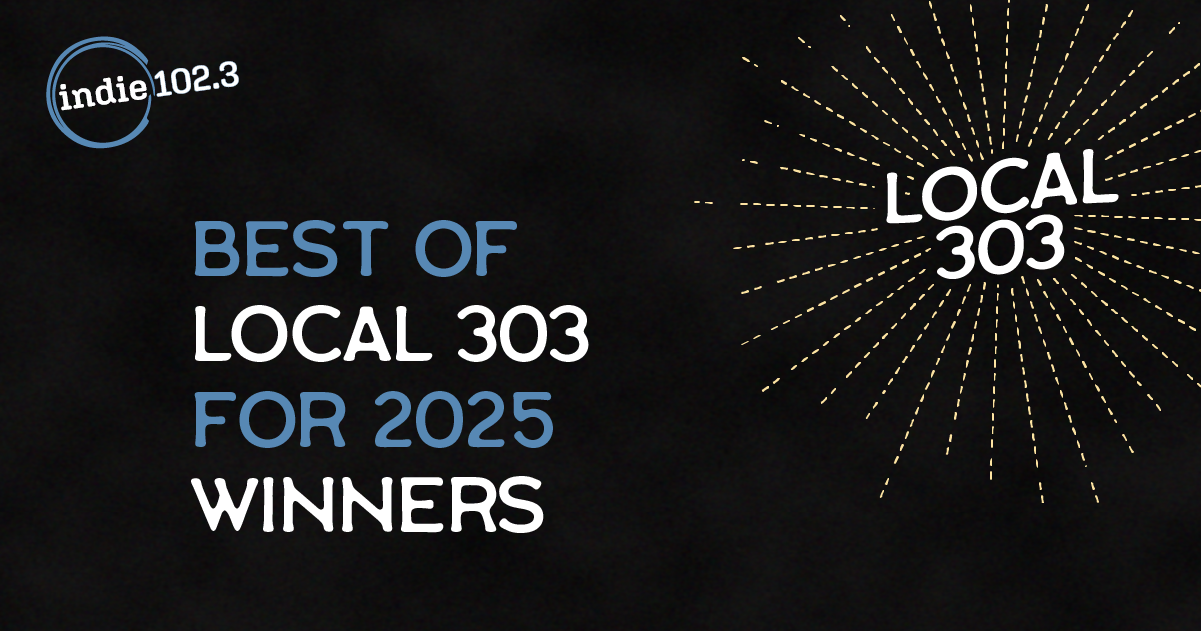
The red sign alerting Denver sidewalk walkers about the portfolio show pointed toward the Art Institute of Colorado building. It may have said “open to the public,” but the irony was this was to be the final portfolio showing.
On Dec. 28, the school, which was established in the early 50s, will close its doors permanently. The school’s end came to light in early summer, about six months after a new owner took over. Many teachers and staff said they were blindsided by the news.
Inside the show, about 50 graduates majoring in areas such as the culinary arts, graphic design, fashion and interior design set up their displays, all accompanied by resumes and business cards — and some raw feelings.
“I’m really upset that the school is closing,” said Stephanie Brahm, who graduated with her Bachelor of Arts in Graphic Design and Web. “It used to be when you graduate you could come in and talk to people who could help you find a job. So, that’s gone now.”
Art history instructor James Sherman was under the impression that the “new parent company was in for the long haul.” It was a surprise later when termination letters arrived between the spring and summer quarters.
“They'd made lots of gestures in that way [and] it looked like things were going along well. And then all of a sudden, boom, sort of out of the blue," Sherman said.

On June 29, this new parent company, Dream Center Education Holdings, filed what’s known as a Worker Adjustment and Retraining Notification. The filing meant 160 people would lose employment by the end of the year.
After the notice, Sherman said things got “very chaotic” at the school and there was “a lot of angst” due to conflicting information floating around. Students and staff then started to leave rapidly. Sherman’s art history class for the summer quarter originally had 15 people enrolled, but only five finished.
In the wake of summer speculation about the Art Institutes, DCEH sent out a statement in July that said it would no longer accept new students at a number of Art Institute campuses, as well as Argosy and South University schools. A later, updated statement said it would “discontinue campus-based programs” at these schools.
Current students were uncertain what this all meant for their education until it was finally confirmed that Dream Center Education Holdings would indeed close dozens of its newly acquired schools.
DCEH did not answer multiple requests for an interview and Art Institute of Colorado staff told CPR News they could not speak to the media. But, back in July, spokeswoman Anne Dean told the Chicago Tribune that enrollment had dropped to “unsustainable” levels and demand had shifted toward online learning. Data provided by the Colorado Department of Higher Education does show a declining student population at the Denver Art Institute location over the last five years.

Many said they were hopeful when DCEH purchased the schools through a $60 million deal. The previous parent company, Pittsburgh-based Education Management Corporation had its own rocky history. After it went public in the mid-90s, its reputation started to slide. It was accused of predatory recruiting and, in 2015, had to pay out a $95.5 million settlement over consumer fraud claims. Over the summer, EDMC filed for bankruptcy.
“The fact that there was going to be a buyer, a lot of people said, ‘hey, great’,” said Sherman, who now teaches at Rocky Mountain College of Art and Design in Lakewood. “And then we found out a little bit more about them and it was like, ‘Oh boy, OK, we'll trust the process.’”
DCEH is part of the Los Angeles-based Christian charity Dream Center. It's best known for its work in areas like poverty, hunger and domestic violence, but it lacked much experience in higher education.
When the purchase was finalized, the regional accrediting Higher Learning Commission changed the accreditation status of four campuses, including the Art Institute of Colorado, to “Candidacy” in January. That typically happens when a school gets a new owner, and the HLC posts this information publicly online. But no one told students and faculty, for a while at least, that the school essentially would be unaccredited.
According to the state Department of Higher Education, the Dream Center said it didn’t notify students about the accreditation change because it was appealing the decision. An email that went out to Art Institute of Colorado students mid-December said that appeal was denied.

Attending an unaccredited school might disqualify a student from financial aid, and employers could look differently at those degrees. Though for many in creative fields, a candidate’s portfolio will likely carry more weight than the degree itself.
Some Art Institute students in Chicago are suing Dream Center, saying they were misled about the school’s accreditation. While there are no lawsuits in Colorado currently, a group students sent a letter to the state Department of Higher Education, Denver Mayor’s Office and Colorado's Attorney General.
Twenty-three-year-old Deanna Brown, of Colorado Springs, graduated from the Art Institute of Colorado’s Interior Design program in March. She found a job, but remains concerned about her future career prospects.
“I didn't think I could stress about school so much after I graduated school,” she said.
Brown hopes to go into commercial design, but is unsure if she qualifies for the national test she’ll need to take to pursue that. If she had known right away about the loss of accreditation, she said she would have transferred.
Unaccredited degrees could also make graduates ineligible for advanced degree programs at other schools.
Art Institute of Colorado students within a year of graduating have been able to transfer all of their credits, including the unaccredited ones, to finish a similar degree at the Rocky Mountain College of Art and Design. This was done through an official teach-out agreement between the two schools which had to be approved by the Higher Learning Commission and covers just six Art Institute degree programs.
Neely Patton, RMCAD’s senior vice president of academic affairs, said within a day of “hearing murmurs” of the Art Institutes closing, her school started getting calls and walk-ins. Many “were heartbroken and very angry,” and it felt like a natural fit to initiate a teach-out agreement.

Students with more than a year to go can transfer up to 60 credits to RMCAD, which is in line with the school’s standard transfer policy. Though it's created challenges for students like Game Art and Design major Richard Lack, 34. He lost nearly half of his credits when he transferred to RMCAD.
Lack is a veteran who joined so the military would pay for college.
“[Now] all that money is gone ... I'm going to have to come out of pocket even though I already did my time," Lack said.
It’s been a difficult transition for Lack, including staying motivated through courses he already took.
“That much money [spent on school] that's like a statement saying, ‘Hey, I'm really going to pursue this. I want to get better at it.’ And for a company like the Dream Center to take that all away is super ironic.”
Patton said there are about 40 Art Institute of Colorado students enrolled in the fall semester and 13 in the spring — and the school has been able to grandfather eligible students who transferred immediately into the teach-out agreement. Like James Sherman, a number of faculty members and staff also made the leap from the Art Institute.
Denver’s Metropolitan State University said it’s taken in about 40 Art Institute students and is working with them on a case-by-case basis to determine which credits will transfer. A number of other local colleges and universities have opened their doors to students scrambling to finish their degrees. These include Arapahoe Community College, Community College of Aurora, University of Denver and Front Range Community College.
Some Art Institute students are also seeking federal student loan forgiveness that applies if a school misled them or broke the law. This is known as “Borrower’s Defense to Repayment.” The U.S. Department of Education, under Betsy DeVos, has proposed making changes to the student loan forgiveness formula.
Many students said they want some kind of loan forgiveness or tuition reimbursement for what they see as an unjust act.









